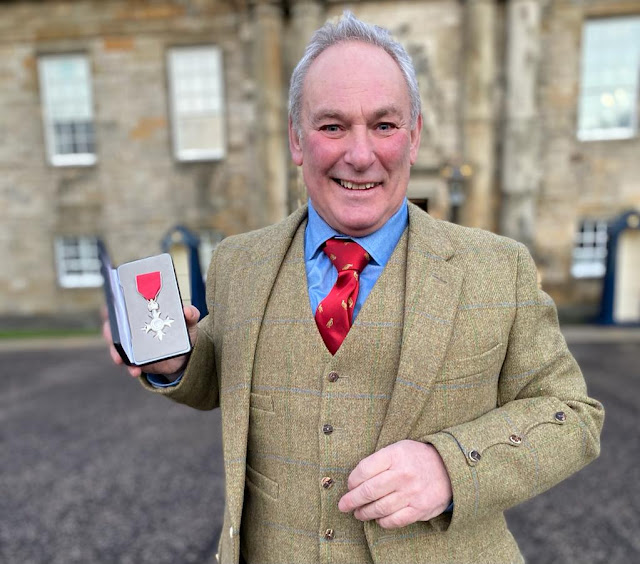As you will be aware, due to an increased risk of incursion of
avian influenza (bird flu) for wild birds, gamebirds, poultry and other captive
birds within the UK, an Avian Influenza Prevention Zone (AIPZ) was declared by
Scottish Ministers, covering the whole of Scotland, on 03 November 2021.
Similar legislation was enacted across all UK administrations.
Subsequently, measures that made it a legal
requirement for all poultry and captive birds (with the exception of game birds
kept for restocking) to be housed or otherwise kept separate from wild
birds, and for all bird keepers to follow strict biosecurity measures in order
to contain and eradicate the disease, were implemented on 29 November 2021.
Following feedback from stakeholders and government colleagues,
and in light of recent outbreaks of highly pathogenic avian influenza within
the UK, we recognised a need to issue the following important
outbreak-specific advice to all involved with gamebirds in Scotland.
Biosecurity
Biosecurity means
simple procedures or steps you can take to prevent disease. The risk of bird
flu in the UK from wild birds never disappears completely and so good
biosecurity should be incorporated into daily practice, but during an
outbreak period it is vital to protect your birds. An outbreak of
bird flu at any size game or poultry establishment can have a
profound impact on the commercial game and poultry
sector through both the introduction of movement restrictions
and temporary loss of exports with other countries.
This biosecurity
guidance includes details of measures that
should be taken in the current Avian
Influenza Prevention Zone and provides specific advice for
game bird keepers. Complete the biosecurity
self-assessment checklist to
ensure you are complying with the mandatory biosecurity requirements.
Legal Requirement
The legal requirement to house all poultry or captive birds in
the UK includes caught-up gamebirds. The aim of this requirement is to
segregate poultry and captive birds, such as caught up gamebirds, from wild
birds as much as is possible to reduce the risk of infection. The exception to
this requirement are game birds kept for restocking supplies. Although
it is important to note that these birds must be supplied with feed and water
either indoors or under a shelter which prevents contact by wild birds with the
feed and water supplied.
Bird Gatherings
A further biosecurity measure integral to the legal restrictions
applied, and key to reducing the risk of onward spread, is the amendment of the
General Licence permitting
bird gatherings (to prohibit gatherings involving kept galliformes
(chickens, turkeys, pheasants, partridges, quails and other land fowl) and kept
anseriformes, (ducks, geese, swans and other water fowl). It is
important to stress that these bird gathering events include the catching-up
of wild game birds. There are, however, exceptions to this and the
following are not considered to be gatherings and do not, therefore,
need to be licensed:
·
catching-up of wild game birds (where
they have come from multiple locations but are then moved to a single
location afterwards, and remain there for breeding or other purposes)
·
birds which are brought together from
different locations, but where no birds move off the premises within 13 days
of the last bird arriving on the premises;
It should be noted, however, that there is some risk that birds
gathered from the wild could be infected with avian influenza, and by gathering
them up and bringing them back to a farm/shoot/estate, this could infect the
birds that are already there. Caught up pheasants are defined as
poultry. Therefore, if disease is confirmed, this would result in a new
infected premises. It is on this basis that all catching up activities
are not recommended whilst the AIPZ measures are still in effect.
This recommendation holds even greater weight for premises that
fall within geographical
areas deemed at particular high risk to avian influenza (HRAs). Check if your premises
falls within one of these areas by using our interactive map (please note the ‘layers’
functionality button top right on this interactive screen to add HRAs to the
map).
Register Your Birds
There is a legal requirement for all poultry keepers with 50 or
more birds to register their premises on the Great
Britain Poultry Register – this includes game keepers. The voluntary
registration of premises with fewer than 50 birds is highly encouraged -
particularly if you are in, or close to, a higher risk area.
General Advice
It should be noted that this is general advice for those whose activities
do not fall within Protection and Surveillance Zones associated with an
outbreak premises, within which specific legal regulations apply.
It is also worth noting that catching up gamebirds is only
legal until 28th February in Scotland.
Avian influenza is a notifiable disease by law. If you find a
single dead wild waterfowl (swans, geese or ducks), a single dead bird of prey,
or five or more dead wild birds of any other species (including gulls) at the
same place at the same time, you should report them to Defra’s GB-wide
telephone helpline: 03459 33 55 77 (please select option 7). It is
advisable that you do not touch these birds.
Know the signs of bird flu in kept
birds,
which include loss of appetite, swollen heads, respiratory problems and
multiple unexpected deaths. If you suspect any type of avian influenza in poultry or captive
birds you must report it immediately by contacting your local APHA office. Failure to do so is an
offence.
Bird flu and its consequences can certainly impact game management
and shooting, but it is also true that game managers and shooters are in a good
position to detect and report outbreaks. Please be vigilant and report any
concerns.
Scottish Government have joined with
organisations involved in gamebird management to issue revised guidance on bird flu and the way it can affect the
activities of gamebird rearers.
Queries specific to gamebirds and avian
influenza can also be addressed to:
The Game Farmers Association
PO Box 3629
Wokingham
RG40 9LG
Tel: 01189 797255
Email: dominic@gfa.org.uk
Scottish Government guidance on avian influenza can be found at:
www.gov.scot/avianinfluenza
You may wish to pass this information on to your members as
appropriate.

